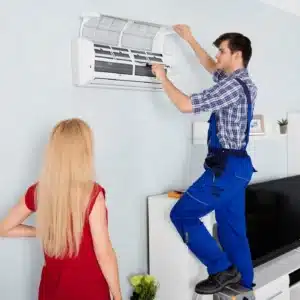Importance of HVAC Maintenance for Commercial Buildings
In Florida’s hot and humid climate, HVAC systems are essential...
Your health and comfort are significantly influenced by indoor air quality. Many health issues such as respiratory and cardiovascular illnesses can be brought on by poor indoor air quality. Factors, such as combustion appliances, construction materials, cleaning supplies, and external contaminants, can contribute to indoor air pollution and cause these illnesses to develop.
Poor indoor air quality can seriously harm people’s health, especially the elderly, children, and those with respiratory and cardiovascular conditions. The following are a few health consequences of poor indoor air quality:
Respiratory Problems: Respiratory conditions including bronchitis, asthma, and chronic obstructive pulmonary disease (COPD) can all be brought on by or made worse by poor indoor air quality.
Cardiovascular Problems: Cardiovascular issues including heart disease and stroke might become more likely as a result of poor indoor air quality.
Cancer: There has been a connection between several indoor air contaminants and cancer, including radon, asbestos, and volatile organic compounds (VOCs).
Neurological Problems: Headaches, light-headedness, and weariness brought on by poor indoor air quality can impair cognitive performance.
Many factors, such as combustion appliances, construction materials, cleaning supplies, and external contaminants, can contribute to indoor air pollution. The following are a few typical sources of indoor air pollution:
Combustion Appliances: Carbon monoxide, nitrogen dioxide, and other dangerous pollutants can be produced by gas stoves, heaters, and fireplaces.
Building Materials: Asbestos, lead-based paint, and formaldehyde-containing items are a few examples of construction materials that can leak dangerous toxins into the air.
Cleaning Products: Many cleaning supplies include substances like ammonia and bleach that might be dangerous to breathe in.
Outdoor pollutants: Indoor air quality may be impacted by outside contaminants like pollen, dust, and smog that enter through windows, doorways, or faulty HVAC filters.
There are a number of ways to enhance indoor air quality and lessen the hazards connected with indoor air pollution, including:
Ensuring Proper Ventilation: Pollutants in indoor air can be reduced with adequate ventilation. To increase air circulation, open the windows and doors. Additionally, a professionally installed HVAC system can significantly improve IAQ.
Using Natural Cleaning Products: Baking soda and vinegar are examples of natural cleaning agents that are efficient in cleaning and disinfecting without releasing hazardous chemicals.
Maintaining Combustion Appliances: Get your gas fireplaces, heaters, and stoves inspected by a professional on a regular basis to make sure they are operating correctly and not emitting any dangerous pollutants.
Controlling Humidity: Mold and dust mite development are both encouraged by high humidity levels. To regulate humidity levels and stop mold formation, use a dehumidifier.
Using Air Purifiers: Dust, pollen, and pet dander are among indoor air contaminants that air purifiers may help get rid of.
Poor indoor air quality can have serious health effects, and it is important to take steps to improve indoor air quality. Having an HVAC system installed is one of the best ways to improve your IAQ. By understanding the sources of indoor air pollution and taking steps to reduce them, we can create healthier indoor environments.
Kyzar Air Conditioning offers expert IAQ solutions for homes and buildings. Based in Florida, we are a state-licensed company with years of experience in installation, maintenance, repairs, and replacement.
Contact us at 561-640-1000.
Disclaimer: All content on this website is intended for informational purposes only. We discourage anyone from attempting to repair, replace, or maintain HVAC systems without the help of a licensed, insured HVAC technician.

In Florida’s hot and humid climate, HVAC systems are essential...

Florida’s warm climate brings many advantages, but it also means...

When it comes to keeping your home comfortable in Florida’s...

In Florida’s hot and humid climate, a reliable air conditioning...

If your air conditioner has been chugging along since the...

Indoor air quality is a big deal, especially in commercial...